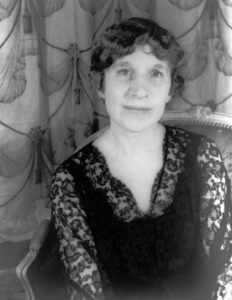
Julia Peterkin
*Julia Peterkin was born on this date in 1880. She was a white-American teacher and author from Laurens County, South Carolina.
She was born Julia Mood. Her father was a physician, and she was the third of his four children. Her mother died soon after her birth, and her father married Janie Brogdon. Janie Brogdon was the mother of Henry Ashleigh Mood, Julia's half-brother and her father's fourth child, who became a doctor. In 1896, at age 16, Julia Mood graduated from Converse College in Spartanburg, South Carolina; she earned her master's degree a year later.
She taught at the public school in Fort Motte, South Carolina, for a few years, then married William George Peterkin in 1903. He was a planter who owned Lang Syne, a 2,000-acre cotton plantation near Fort Motte. She began writing short stories inspired by the everyday life and management of the plantation. She was audacious as well as gracious. Peterkin sent highly bold letters to authors Carl Sandburg and H.L. Mencken and included samples of her writing about the Gullah culture of coastal South Carolina.
Living chiefly on the plantation, she invited Sandburg, Mencken, and other prominent people to the plantation. Sandburg, who lived within a day's travel in Flat Rock, North Carolina, visited. Although Mencken did not come, he became Peterkin's literary agent in her early career, as possible proof of her persuasive letters. Eventually, Mencken led her to Alfred Knopf, who published Green Thursday, her first book, in 1924.
In addition to several later novels, her short stories appeared in magazines and newspapers throughout her career. Peterkin won a Pulitzer Prize in 1929 for her book Scarlet Sister Mary. Dr. Richard S. Burton, the chairperson of Pulitzer's fiction-literature jury, recommended that the first prize go to the novel Victim and Victor by John Rathbone Oliver. The School of Journalism chose her book, and Burton resigned from the jury.
The book aroused some controversy in the South. The public library in Gaffney, South Carolina, classified it as obscene and banned it. However, The Gaffney Ledger published the complete book in serial form. In 1932, Peterkin performed as an actress, playing the main character in Ibsen's Hedda Gabler in Columbia, South Carolina. In 1933, Peterkin was contacted by Caroline Pafford Miller of Baxley, Georgia. Miller sought a publisher for her first novel, Lamb in His Bosom, and hoped to enlist Peterkin's help. Peterkin forwarded Miller's name and manuscript to her publisher. In 1933, Harper released Lamb in His Bosom. Miller won the Pulitzer Prize for the novel in 1934.
In 1998, the Department of English and Creative Writing at her alma mater, Converse College, established The Julia Peterkin Award for poetry, open to everyone. One of the few white authors who wrote about the American Black experience, Julia Peterkin, died on August 10, 1961.